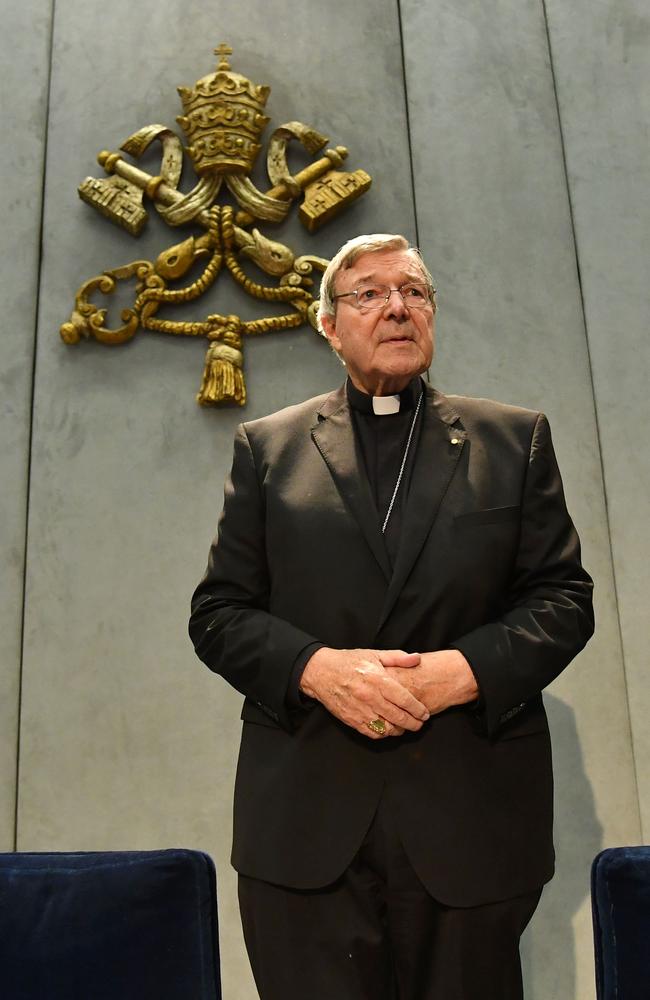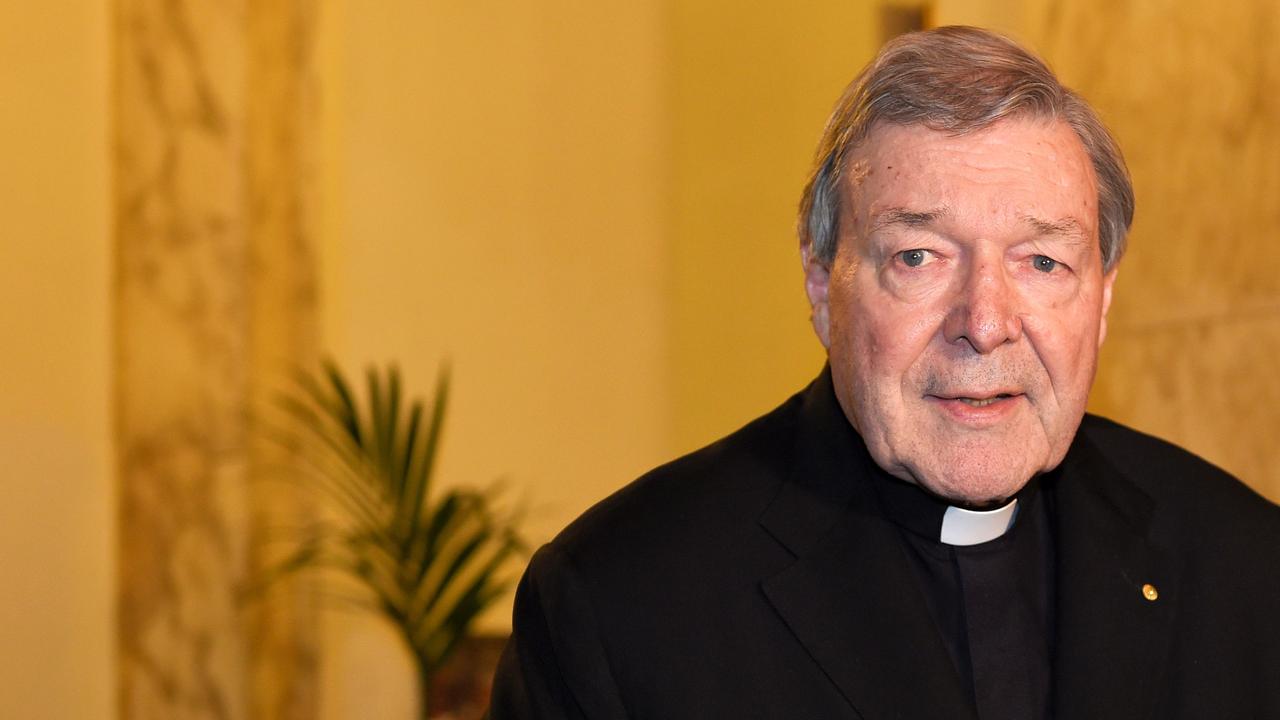Joe Hildebrand: What is George Pell really guilty of?
As satisfying as it may be for victims of church abuse to see George Pell punished, it’s vital that he is punished for the right thing, Joe Hildebrand writes.
About a decade ago, I went to George Pell’s house and we sat down for a chat.
At the time, I was a man at sea. I had been reluctantly liberated from my role as a political reporter and columnist by a newly appointed editor and found myself somewhat lost as to what to do next.
And so I asked myself: What is the biggest story in the world? Who would be the ultimate person to talk to?
I recalled a line from my favourite movie, in which Daily Planet editor Perry White demands his reporters find a way to talk to Superman.
This, he declared, would be “the single most important interview since God talked to Moses”.
That’s it, I thought. I would interview God.
The idea was to interrogate the top religious and scientific leaders in the nation and ask them to define the meaning of God and the universe. Instead of being beset by the mortal minutiae of day to day living the news pages would tackle the greatest question of humanity: Who are we? Why are we here? What is the meaning of life?
It was ambitious, unprecedented and limitless in scope. And, needless to say, it was a hopeless failure.
But it did lead me to the doorstep of George Pell’s personal residence just next to St Mary’s Cathedral in Sydney.

The first thing that struck me was how poky it was, and also how familiar.
There is something about Catholic households that makes them all the same: Dimly lit, sepia-toned and cluttered with trinkets — all under the inevitable gaze of an oval-framed blue-eyed Jesus.
It could have been my grandmother’s weatherboard lounge room in Dandenong, except that it was the official residence of the Archbishop of Sydney.
Pell himself barely seemed to fit in it. He was a giant grey hulk of a man and carried the stoop of someone who had had too many unwelcome encounters with light shades and door frames.
He was also an undeniably intimidating man in both body and mind.
We were at opposite ends of the ideological spectrum in almost every regard, and I was far more precocious about my own intellectual powers then than I am now but his clarity of thought and the supreme, almost supernatural, confidence with which he held his ideas was hypnotic.
It was not so much the power of his arguments that swayed you as the fact that he was so unshakeably sure of them. How could a man so absolutely, unwaveringly, positively convinced of what he was saying possibly be wrong?
We went well over the time his people had given us and spoke for maybe an hour, covering everything from heaven and hell to God and the Devil to the very nature of good and evil itself. Out of all of this there were two revelations that have stayed with me ever since.
One came after I quizzed him about his infamous refusal to give communion to gay Catholics, which seemed to me a particularly cruel act.
Here you had someone before you clearly deeply faithful and begging for acceptance and yet you would publicly cast them aside before a whole congregation. That hardly seemed the act of a man of God.
Pell’s response was an astonishing combination of pragmatism and principle that was at once both bizarre and brilliant.
How was he to know if someone was gay or not? If someone came before him in Mass with cupped hands of course he would give the bread and wine. He was hardly going to quiz each parishioner.
But if someone came before him in a rainbow sash — as the gay parishioners had — in what he saw as an open act of rebellion against the church, then he was duty bound as a servant of the church to defend its honour.
In other words, he was saying with a bit of a wink and a nudge that any gay person could easily get communion if they didn’t make a fuss about it — much like the US Army’s infamous former “don’t ask, don’t tell” policy. But if they were going to pick a fight over it then it was a fight he would finish.

In a sense, this was the Jekyll and Hyde in Pell. There was the conservative church statesman who treasured its pomp and ceremony, its ritual and solemnity, and wanted nothing more than for it to go on as it had always been untainted by earthly concerns and certainly untainted by the slightest hint of sexuality.
And then there was the reactionary religious warrior who, if that idyllic vision was compromised, would fight to the death for absolute uncompromising orthodoxy.
This was Pell, if you like, in the real world.
But the second thing I always remembered of him was even more striking, and this was the metaphysical Pell.
Throughout the conversation he had always insisted — in the tone of a perfectly rational argument — that God was goodness and goodness was God. Humans, on the other hand, were inherently selfish.
Here I thought I might catch him in a rhetorical trap.
What, I asked him, if the most avowed non-believing atheist saved somebody’s life. Would that not simply be a good act? A selfless act?
No, he said simply. Because no matter how good the act the human — believer or not — would also feel good about doing it. No matter how altruistic they pretended to be it was inevitable that they would receive some sense of self-satisfaction. Hence, he concluded — with, I couldn’t help but notice, a sense of self-satisfaction — it was still ultimately a selfish act. All good acts were God’s alone.
It was at this point that everything I thought about Pell had changed.
I didn’t agree with him any more than I had an hour ago — indeed, my very being was a violation of his world view. I was the child of a divorced Catholic mother whom he would have refused communion, I was a wild young man who had taken countless drugs, who had consorted with gay men and lesbians and whose girlfriends had purchased more than one morning after pill, and despite these many sins I had never set foot in a confessional once in my debauched and decadent life.
In both my nature and my mind I opposed almost every aspect of Pell’s ideology.
And yet here he was admitting that by ideology he himself was incapable of any good unselfish act. Pell wasn’t immoral, I realised, quite the reverse. He was a moral extremist.
He was someone to whom both himself and the whole world would always be inescapably beset by sin.
Related story: Former Prime Minister John Howard has written a character reference for George Pell

It is easy to be an armchair pop psychologist and argue that this is why Pell was able to support a paedophile priest in court or tell the parents of abuse victims they’d better be ready for a fight.
Indeed, I suspect it is true that this was what allowed the whole hierarchy of the Catholic Church to tolerate industrial scale child abuse for so long.
If you see sin everywhere and everything as sinful then it becomes almost impossible to deal with one sin over another. For an ultraconservative Catholic, paedophilia was certainly a sin but so was divorce, homosexuality and even sex before marriage.
That is the madness of extremist ideology.
Maybe that explains Pell’s coldness, what many have described as his sociopathy. Certainly his failure to act with kindness and compassion when dealing with victims — or a sense of righteous justice when dealing with perpetrators — seems to speak to a man whose view of the world is as black as his cardinal robes.
I believe he ought to be condemned for these failings and at the very least he ought to show some Christian contrition. For such a supposedly devoted man of the cloth he has been repeatedly guilty of the deadly sin of pride.
However that is not what Pell has been tried for and that is the problem.
For many it is clear that Pell’s jailing is a watershed moment that has delivered some kind of catharsis, some sense that the system finally worked — perhaps even some sense of revenge. For many others — including the dead — it is far too little, far too late.
Certainly it has been clear from many responses, by survivors and commentators alike, that they see Pell as being punished for many other crimes on top of the one confirmed in the Victorian County Court.
But by conflating one incident at St Patrick’s Cathedral in the mid-1990s with the myriad atrocities committed by Catholic clergymen throughout the decades — including Pell’s own sins of omission — the sense of justice may be short lived.
As satisfying as it may be for victims of church abuse to see Pell punished, it is vital that he is punished for the right thing.

Firstly, there is every chance Pell’s conviction could be overturned on appeal.
Would that then dissolve all the sins committed by the church as a whole? Or even his alone? Would those so loudly declaring vindication for the first verdict suddenly have their truth rendered void?
Meanwhile, the culture of the Catholic Church’s hierarchy, which is truly to blame for what happened within its walls, marches on unchanged.
Just this week there was a summit at the Vatican that attempted to address this but it accomplished virtually nothing — maybe because the summit itself was comprised almost entirely of the Catholic Church’s hierarchy and maybe because it received only a fraction of the attention of Pell being brought down.
I know something about the rage that comes from child sex abuse, and that rage is both righteous and real.
But the revolution will only come when rage is replaced by reason and the anger gives way to change.
Continue the conversation @Joe_Hildebrand




